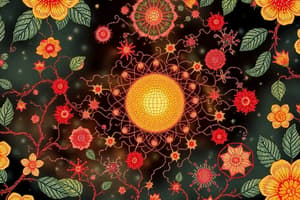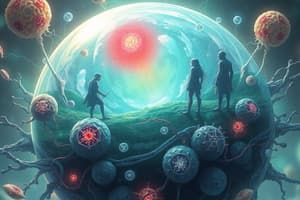Podcast
Questions and Answers
What is the primary function of metabolism in living organisms?
What is the primary function of metabolism in living organisms?
- To sum all chemical reactions (correct)
- To facilitate reproduction
- To synthesize necessary compounds
- To maintain homeostasis
Which type of reproduction involves the fusion of gametes from two parents?
Which type of reproduction involves the fusion of gametes from two parents?
- Binary fission
- Asexual reproduction
- Sexual reproduction (correct)
- Budding
Which statement regarding cell theory is accurate?
Which statement regarding cell theory is accurate?
- All cells arise from non-living matter
- All living organisms are composed entirely of prokaryotic cells
- All cells contain a nucleus
- Cells are the basic unit of life (correct)
What process describes the survival and reproduction of organisms with favorable traits?
What process describes the survival and reproduction of organisms with favorable traits?
What is the correct order of the hierarchical categories in taxonomy?
What is the correct order of the hierarchical categories in taxonomy?
What does homeostasis refer to in living organisms?
What does homeostasis refer to in living organisms?
What is an example of a prokaryotic cell?
What is an example of a prokaryotic cell?
Which term describes a community of living organisms and their physical environment?
Which term describes a community of living organisms and their physical environment?
Flashcards are hidden until you start studying
Study Notes
Basic Concepts in Biology
- Definition: Biology is the scientific study of life and living organisms, encompassing their structure, function, growth, evolution, distribution, and taxonomy.
Life Processes
-
Metabolism: The sum of all chemical reactions occurring in an organism.
- Catabolism: Breakdown of molecules to obtain energy.
- Anabolism: Synthesis of compounds necessary for cell maintenance and growth.
-
Homeostasis: The ability of organisms to maintain a stable internal environment despite changes in external conditions.
-
Reproduction: The process by which organisms produce new individuals.
- Asexual Reproduction: Offspring arise from a single organism (e.g., binary fission, budding).
- Sexual Reproduction: Involves the fusion of gametes from two parents.
Cellular Biology
-
Cell Theory:
- All living organisms are made of cells.
- The cell is the basic unit of life.
- All cells arise from pre-existing cells.
-
Types of Cells:
- Prokaryotic Cells: Simple, no nucleus or membrane-bound organelles (e.g., bacteria).
- Eukaryotic Cells: Complex, with a nucleus and membrane-bound organelles (e.g., plant and animal cells).
Genetics
- DNA Structure: Double helix made of nucleotides (adenine, thymine, cytosine, guanine).
- Gene: A segment of DNA that codes for a protein.
- Inheritance: Transmission of genetic information from parents to offspring.
- Mendelian Genetics: Study of inheritance patterns (dominant and recessive traits).
Evolution
- Theory of Evolution: Proposed by Charles Darwin; states that species evolve over time through natural selection.
- Natural Selection: Process where organisms with favorable traits survive and reproduce.
- Speciation: The formation of new and distinct species through evolution.
Ecology
- Ecosystem: A community of living organisms and their physical environment.
- Biomes: Large geographical areas with distinct climates and organisms (e.g., deserts, forests).
- Food Chain/Web: The flow of energy and nutrients through an ecosystem, showing who eats whom.
Classification of Life
- Taxonomy: The science of classifying organisms into groups.
- Hierarchical Categories:
- Domain
- Kingdom
- Phylum
- Class
- Order
- Family
- Genus
- Species
- Hierarchical Categories:
Human Biology
- Organ Systems: Groups of organs that perform specific functions.
- Circulatory System: Transports blood and nutrients.
- Respiratory System: Facilitates gas exchange.
- Digestive System: Breaks down food and absorbs nutrients.
Plant Biology
- Photosynthesis: Process by which plants convert sunlight into energy (glucose), using carbon dioxide and water.
- Plant Structures:
- Roots: Anchor plants and absorb nutrients/water.
- Stems: Support plant structure and transport materials.
- Leaves: Main site of photosynthesis.
Important Tools and Techniques
- Microscopy: Use of microscopes to observe small structures.
- DNA Sequencing: Determining the order of nucleotides in DNA.
- PCR (Polymerase Chain Reaction): Technique to amplify DNA segments for analysis.
Biology: The Study of Life
- Definition: Biology is the scientific study of living organisms, covering their structure, function, growth, evolution, distribution, and classification.
Life Processes
- Metabolism: The sum of all chemical reactions within an organism.
- Catabolism: Breakdown of molecules to release energy.
- Anabolism: Synthesis of molecules for cell growth and maintenance.
- Homeostasis: Maintaining a stable internal environment despite external changes.
- Reproduction: The process of creating new individuals.
- Asexual Reproduction: Offspring from a single parent (e.g., binary fission, budding).
- Sexual Reproduction: Fusion of gametes from two parents.
Cellular Biology
- Cell Theory:
- All living organisms are composed of cells.
- The cell is the fundamental unit of life.
- All cells arise from pre-existing cells.
- Cell Types:
- Prokaryotic Cells: Simple, lack a nucleus and membrane-bound organelles (e.g., bacteria).
- Eukaryotic Cells: Complex, possess a nucleus and membrane-bound organelles (e.g., plant and animal cells).
Genetics
- DNA Structure: A double helix composed of nucleotides (adenine, thymine, cytosine, guanine).
- Gene: A DNA segment coding for a specific protein.
- Inheritance: Passing genetic information from parents to offspring.
- Mendelian Genetics: The study of inheritance patterns (dominant and recessive traits).
Evolution
- Theory of Evolution: Proposed by Charles Darwin, stating that species evolve over time through natural selection.
- Natural Selection: Organisms with favorable traits survive and reproduce more successfully.
- Speciation: The formation of new and distinct species through evolution.
Ecology
- Ecosystem: A community of living organisms and their physical environment.
- Biomes: Large geographic areas with distinct climates and organisms (e.g., deserts, forests).
- Food Chain/Web: The flow of energy and nutrients through an ecosystem, showing predator-prey relationships.
Classification of Life
- Taxonomy: The science of classifying organisms into groups.
- Hierarchical Categories:
- Domain
- Kingdom
- Phylum
- Class
- Order
- Family
- Genus
- Species
Human Biology
- Organ Systems: Groups of organs working together for specific functions.
- Circulatory System: Transports blood and nutrients.
- Respiratory System: Facilitates gas exchange.
- Digestive System: Breaks down food and absorbs nutrients.
Plant Biology
- Photosynthesis: Plants convert sunlight into energy (glucose) using carbon dioxide and water.
- Plant Structures:
- Roots: Anchor plants and absorb nutrients/water.
- Stems: Support plant structure and transport materials.
- Leaves: The primary site of photosynthesis.
Important Tools and Techniques
- Microscopy: Using microscopes to observe small structures.
- DNA Sequencing: Determining the order of nucleotides in DNA.
- PCR (Polymerase Chain Reaction): Amplifying DNA segments for analysis.
Studying That Suits You
Use AI to generate personalized quizzes and flashcards to suit your learning preferences.




